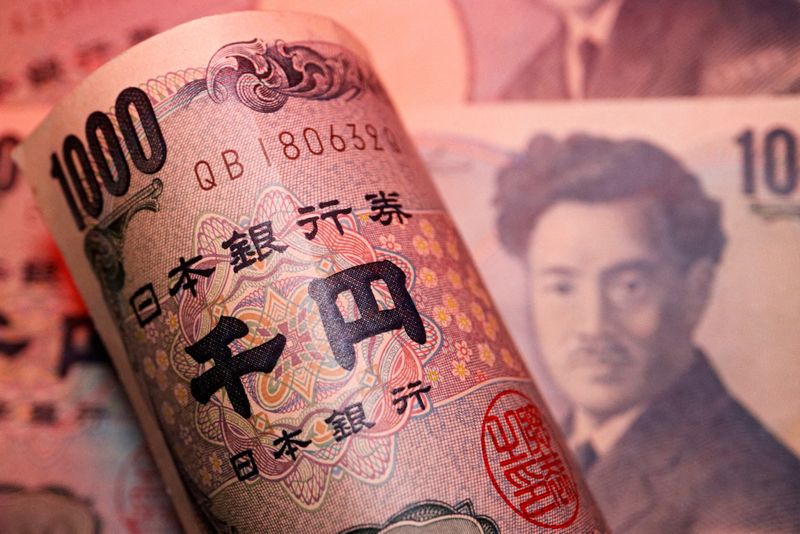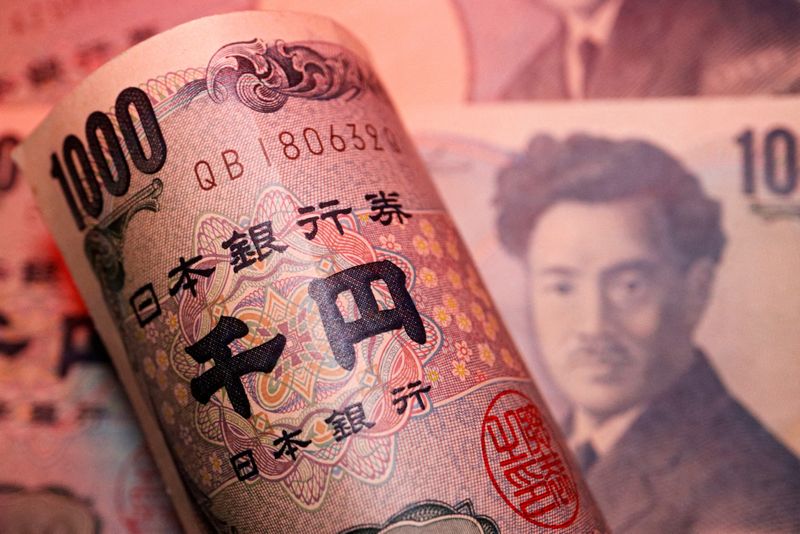
By Tom Westbrook and Amanda Cooper
SINGAPORE/LONDON (Reuters) -The Japanese yen grazed six-week highs before retreating against the dollar on Thursday, keeping traders alert to any signs of official buying, while the euro trod water ahead of a European Central Bank meeting.
The single European currency held near four-month highs ahead of the ECB’s decision, which is all but certain to result in no change to monetary policy, leaving traders to focus on what the chances of a September rate cut might be.
“We expect the ECB to emphasise that future interest rate cuts will be dependent on further declines in inflation and wages growth,” said Commonwealth Bank of Australia (OTC:CMWAY)’s Joe Capurso.
“The risk is that pricing for the September cut is reduced.”
The euro was roughly steady at $1.09325. Markets currently show traders believe euro zone rates will fall at least once more this year, with a reasonable chance of another drop on top of that..
The pound, meanwhile, traded around one-year highs, dipping below $1.30 after British data showed a slower moderation in wage growth than expected in May, which kept the chances of an August rate cut well under 50%.
Sterling was last flat at $1.29895, but is on course for a 2.1% rise so far this year, making it the best-performing major currency against the dollar, largely down to the rate outlook.
“Markets think an August rate cut by the BoE is less likely, while the chances of a Fed cut in September have risen,” Andrew Goodwin, chief UK economist at Oxford Economics, said.
“I suspect the recent appreciation will prove to be short-term noise, and that we’ll soon settle into a pattern where both the BoE and Fed are easing at a similar pace. So this is likely to stabilise sterling around its current level,” he said.
YEN SURGE
The yen strengthened by as much as 0.53% overnight, as the dollar extended a protracted slide that has put it on track for its biggest two-week decline versus the Japanese currency this year, down 2.8% in that time.
The dollar was last up 0.15% at 156.445, still almost 5 yen below where it was just over a week ago.
Bank of Japan money market data suggested authorities may have bought nearly 6 trillion yen ($38 billion) last week, and traders said this week’s moves bore the hallmarks of further intervention, or at least of markets easily spooked by that prospect.
“Many traders and Japanese investors, after intervention, were looking to reload on their trades,” said National Australia Bank (OTC:NABZY) strategist Rodrigo Catril in Sydney.
“The big move (on Wednesday) would have caught them offside and triggered a little bit of a reassessment if not an unwinding of those positions.”
Net yen shorts stood near a 17-year high last week.
Interest rate markets are pricing more than 60 basis points of U.S. interest rate cuts this year and some 20 basis points of hikes in Japan, narrowing the wide rates gap that had encouraged investors taking on large short positions in the yen.
Catril and other analysts also pointed to remarks from U.S. presidential candidate Donald Trump – who described the dollar’s strength and the weakness of the yen and yuan as a big problem in a Bloomberg Businessweek interview – as rattling markets.
So far this year, the yen is the worst-performing G10 currency against the dollar, losing more than 9%, while the yuan is down about 2.2%.

The Australian dollar caught a small boost from some mixed jobs data and traded up 0.1% at $0.6732, while the New Zealand dollar was down 0.15% at $0.6073.
($1 = 156.3600 yen)
This post is originally published on INVESTING.



